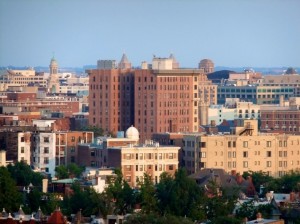The DC Council took an important step recently to ensure that affordable housing is built every time city-owned land is sold for residential development. The new law requires that up to 30 percent of housing developed from DC land will be affordable for low and very low-income residents. The new rules are needed because, even recently, the city has sold land with no affordable housing set-aside.

There were last-minute changes to the legislation, approved in late October, which will lessen its impact in some cases. Nevertheless, the outcome is a big step forward and demonstrates the District’s commitment to use all possible resources to make the city affordable to all residents.
The Disposition of District Land for Affordable Housing Act allows DC-owned land to be sold below market value, and in return, requires developers to make a portion of the new housing there affordable. This smart approach pairs private and public resources, creates mixed-income communities, and helps low-income residents live in developing areas with better job, school, and retail opportunities.
The new housing will be affordable to the city’s families who struggle the most with DC’s rising costs of living. A quarter of the affordable units in rental buildings will be for residents with incomes under $29,000 for a family of three (30 percent of AMI), and the rest will serve residents making up to $48,000 for a family of three (50 percent of AMI) For homeowner properties, the affordable units will be split between residents earning under $48,000 and those earning under $78,000 for a family of three (80 percent of AMI).
One of the changes adopted by the Council prioritizes public buildings — like libraries — over affordable housing when DC a project includes both housing and a public building. This means a developer could be required to use savings from buying DC land below-market value to build a new public building without having to make any of the new housing affordable.
Another amendment affects cases where the full affordable housing requirement may not be financially possible, if the land value is not enough to cover the cost. Under the initial legislation, DC’s independent Chief Financial Officer (CFO) would determine the maximum affordable housing possible from a given land sale. But a last-minute amendment made the CFO’s assessment advisory, rather than binding. This means that while an independent assessment may support 20 percent affordable housing in a given project, the developer, the mayor or DC Council could still push for a smaller set-aside.
Nevertheless, the new legislation creates a unique opportunity to use the rapid growth in property values to develop affordable housing units without using tax dollars. Low-income residents will get to live in mixed-income areas that have greater economic opportunities such as access to job centers, higher-quality schools, and greater public amenities.
In other words, the benefits of a growing DC will be spread a little bit wider.
To print a copy of today’s blog, click here.
